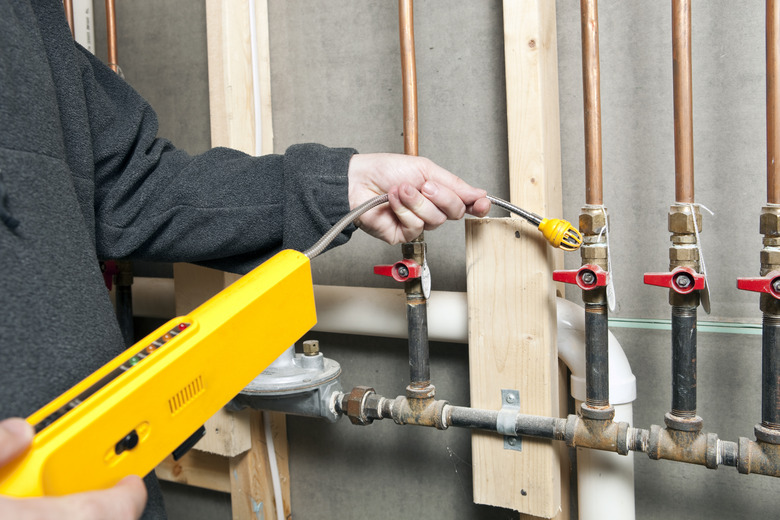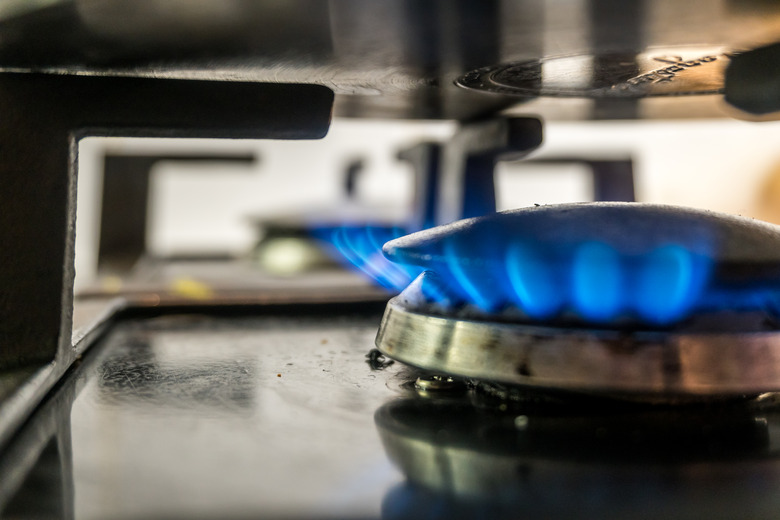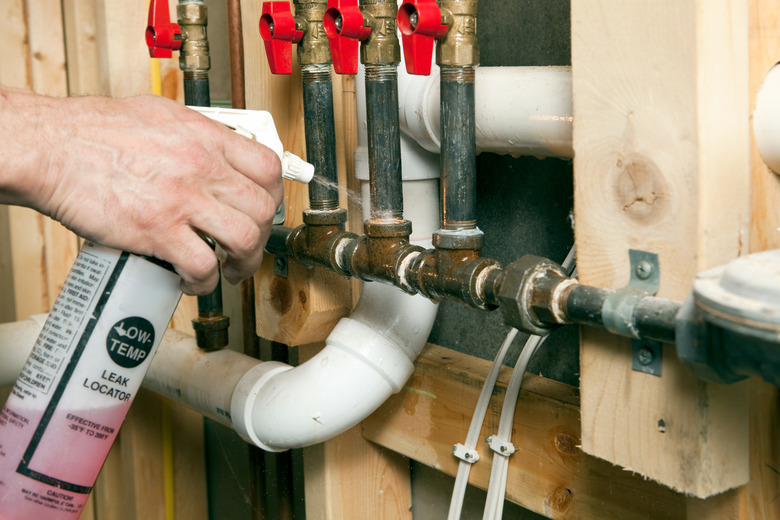Gas Leaks In The Home — How To Detect Them And What To Do
We may receive a commission on purchases made from links.
A gas leak in the home isn't necessarily a panic situation, but it is a serious one. Being highly flammable, gas can and does sometimes cause explosions and fires, so it's important to find and deal with leaks swiftly.
Sometimes, gas leaks are obvious. Slow leaks, however, often prove to be far more subtle. Fixing small leaks is just as important as fixing big ones, but it can be harder to find the source of the leak when they're smaller. If you suspect you have a gas leak but aren't sure where, don't waste time trying to track it down. Instead, leave the house immediately and leave the door open behind you. Once outside, call the gas company and report that you may have a problem. A gas leak is a potentially volatile situation and something with which you don't want to take chances. Leave finding and fixing the issue to the professionals.
How It All Works
How It All Works
Again, it's important that you evacuate quickly if you suspect a gas leak rather than tracking it down or even turning off your gas first. It is, however, a good idea to have a basic understanding of your gas system so you can shut it off if you need to or recognize when something looks amiss.
You'll find a gas meter outside your home where the gas comes into the building. On one side of the meter is the gas pipe that carries in gas from the gas company. This portion of the pipe, called the street side, has a shutoff valve that requires a wrench to close. As a general rule, gas companies prefer that you not mess with this valve. Closing this valve stops gas from entering your home.
On the other side of the meter, known as the house side, there is another pipe that carries gas from the meter to the interior of the home. There is a shutoff valve on this pipe as well, and this is the one you should use whenever possible. You'll find the shutoff valve somewhere between the pressure regulator, which looks like a little flying saucer, and the first gas appliance in your home's gas line. This valve is typically just a small lever that is open when it's parallel to the pipe. To close it, simply turn it 90 degrees so that it's perpendicular to the pipe.
Once inside, gas is carried through your home by metal piping that runs along the top of crawl spaces or along the basement ceiling, traveling horizontally until they reach a gas appliance. At this point, a vertical tube called a drop line extends down from the horizontal pipe and to the home's appliances. If the appliance is above the main gas line, the drop lines go up rather than down and are instead called risers.
You'll also note that there are flexible metal supply tubes between your gas appliances and the gas branch piping. These flexible tubes carry gas from the rigid pipes in your home to the appliance, allowing for a little wiggle room. Flexible connectors are not allowed to go through walls, floors or ceilings and thus are always visible behind your appliances. They're usually 3 to 6 feet in length.
This flexibility makes it easier to reach the gas intake on the appliance and gives you a little room if you need to pull the appliance away from the wall for service. Many times, you will find another shutoff lever or valve just before this flexible pipe so you can turn off the gas at the appliance.
Home Gas Leak Signs
Home Gas Leak Signs
Gas has a distinct sulfur smell (or rotten eggs) that is added to it intentionally. Since you can't see natural gas or smell it by itself, gas companies add that rotten egg smell so you can easily detect a leak. In most major gas leaks, the smell is potent and almost impossible to miss.
Unfortunately, small gas leaks may not create a strong smell. It's also possible to become accustomed to the odor if exposed to it for a long period of time. A slow leak, for example, may create only a mild smell that you get used to after being exposed to it for too long.
Fortunately, there are other signs for which you can look if you miss the smell. One is browning and dying plants. Whether they are outside near your meter or houseplants living indoors, vegetation will wither and die when exposed to a natural gas leak. You may also notice a whining or hissing sound when you get near a gas leak or see a small white dust cloud around the leaking area.
Your gas stove can also alert you to a problem in your home. The flames of your stove burners should be blue. If they're yellow or orange, you have an issue. Of course, visibly cracked or broken gas lines also indicate an obvious problem, as does an unexplained increase in your gas bill.
Outside, strange bubbles in a creek or nearby stream can indicate a gas leak. A spray of dirt rising into the air can also signify a leak. You won't see the gas itself, but the force of the leak is strong enough to disturb loose dirt, and you can see that.
Gas Leaks and Health Symptoms
Gas Leaks and Health Symptoms
In addition to causing problems around the house, a gas leak can affect your health — when exposed to natural gas, you may experience physical symptoms like dizziness, nausea, shortness of breath and fatigue. You may start to notice that you're having frequent headaches and nosebleeds along with a sore throat. Some people experience ringing in their ears, a reduced appetite and chest pain.
Of course, all of these symptoms can indicate other health issues that have nothing to do with gas. To identify gas as the cause, pay attention to when you get sick. If it happens often when you return home from being somewhere else or when you walk into a certain room, a gas leak might be to blame. Keep an eye on your pets as well. They can experience many of the same symptoms.
Gas Leak Don'ts
Gas Leak Don'ts
If you suspect a gas leak, don't doubt yourself. Trust your gut and get your family and pets out of the home. Don't hang around to try and turn off the gas or try to fix a leak yourself. This is a job always left to the professionals no matter how strong your DIY game.
As you're leaving, stay away from any and all appliances and light switches. Turn on nothing that uses electricity, as this can cause a spark and ignite any gas in the home. Don't start your car if it's in your garage. Walk to a safe place instead. If you have a minor issue, open your windows on your way out to air out the house. If the gas odor is strong, however, don't open them.
This seems illogical since airing out the house is smart and ultimately necessary, but the friction of the sliding window could be enough to cause a spark (a little static electricity is all it takes). Absolutely open your windows and air out your house when the gas company tells you it's safe to go back inside but don't do so before if the gas odor in your home is strong.
Of course, don't light a cigarette, candle or match if you suspect a gas leak. Never use a phone inside the home either, whether it's a cellphone or a landline. Call the gas company only when you're safely outside the home but do call them. Never allow a suspected gas leak to go unreported.
Stay Safe With Gas Personnel
Stay Safe With Gas Personnel
Once a gas leak is reported, the gas company will absolutely send someone to do an inspection, fix any problems and turn your gas back on if applicable. You should listen to any safety instructions gas company personnel give you but make sure you are actually dealing with legitimate gas company employees.
Unfortunately, some unscrupulous people sometimes pose as utility company employees in an effort to gain access to homes. It's perfectly acceptable to ask gas company workers for their identification. If something strikes you as off, you can also call the gas company and verify whom they sent to your home. Legitimate utility personnel will never get upset when asked to show identification and will never need to discuss your gas bill or account payment status with you in order to fix a gas leak.
This is true whenever you report a gas leak and when you've called the gas company and asked them to check your home. Routine inspections of gas lines and appliances can help prevent gas leaks, but it's important to verify whom you're letting into your home, even when you're expecting a gas company representative. If the gas company appears at your door unexpectedly due to a problem in the neighborhood, always ask for identification.
Gas Leak Detectors
Gas Leak Detectors
People often make the mistake of assuming that they're covered if they have carbon monoxide detectors, but this is not true — carbon monoxide is released only when gas burns. Having a carbon monoxide detector is smart, but it won't detect a gas leak. Never assume that you don't have a gas leak based on a carbon monoxide detector.
Instead, consider installing gas leak detectors in your home. These detectors will monitor for gas leaks and sound an alarm if they detect one. They're easy to install just like smoke detectors. Many of these units plug into an electrical outlet, but you can find battery-powered units for more flexible installation.
Preventing Gas Leaks and Problems
Preventing Gas Leaks and Problems
Gas leaks happen, but there are steps you can take to reduce the risk. The best way is to have professionals come and inspect your gas appliances and gas lines once a year. Inspections allow you to spot potential problems and fix them before they become an issue. Ask to have any applicable chimneys, flues or vents checked during the inspection.
It's also important that you allow proper ventilation space around gas appliances. This prevents gas from getting trapped and building up around the appliance. Always store flammable chemicals well away from gas appliances and gas lines as well.
Keep a fire extinguisher on hand in case you do run into a problem and make sure you have an emergency plan in place. Teach every member of your family the signs of a gas leak and make sure they know to evacuate and then call for help if they suspect or detect one.


